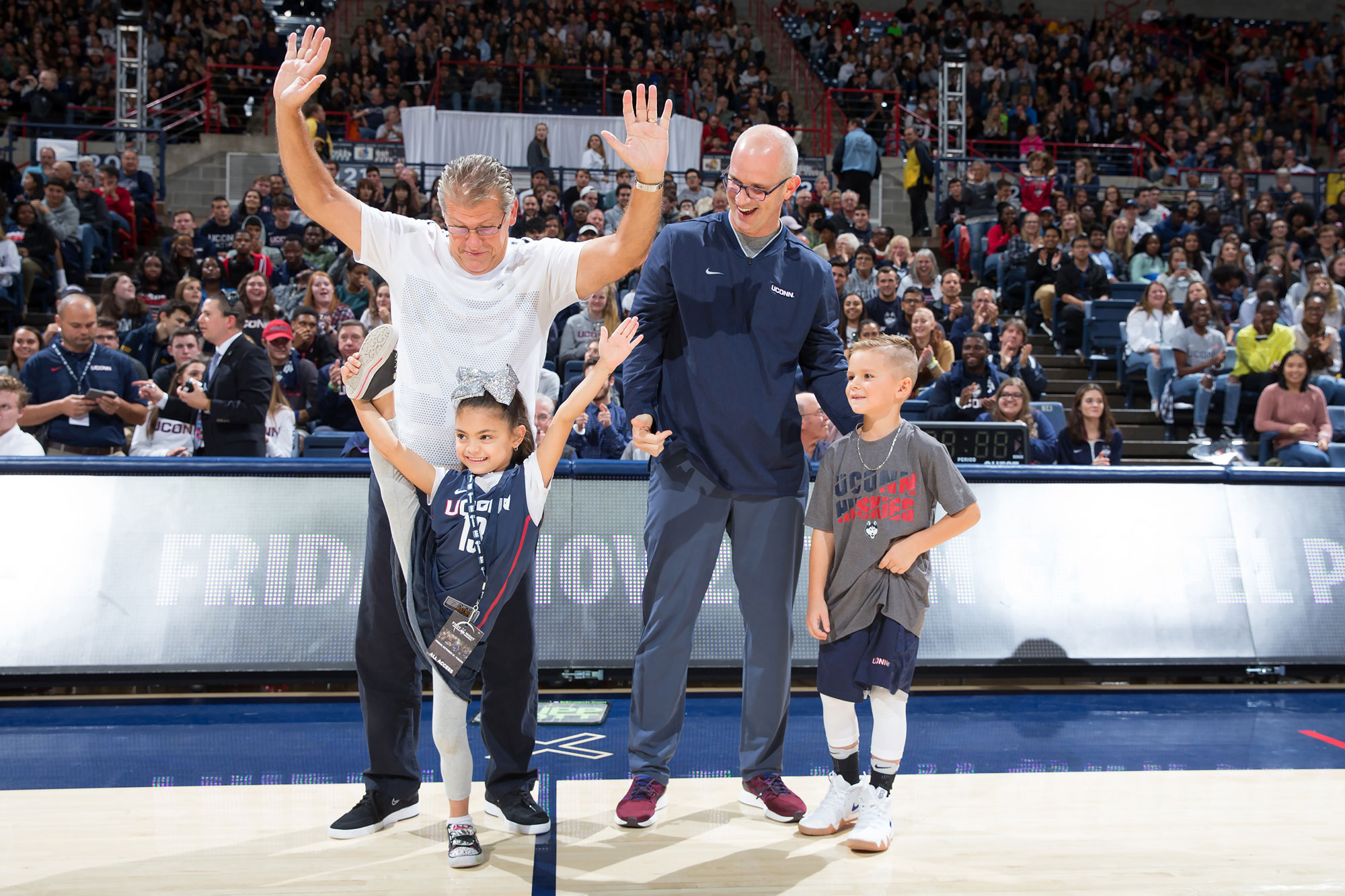
Team Impact
A Winning Way to Heal
By Elizabeth Omara-Otunnu
Photos by Stephen Slade ’89 (SFA) and Peter Morenus
IF you watched any Husky men’s basketball home games this season, you likely caught glimpses of a towheaded youngster shooting baskets with the players during warm-ups, giving them high-fives as they returned to the court after halftime, or exchanging an “air handshake” with players on the bench each time one of the team scored a three-pointer. His name is Rylan Ellingwood, he’s 7 years old, and he’s a member of the team.
Women’s fans who came to First Night, the official opening of basketball season, were introduced not only to the new student-athletes but also to a little girl with some nifty dance moves. As 6-year-old Daniela Ciriello stood on the court with Coach Geno Auriemma (and alongside Rylan and Coach Hurley), she endeared herself to the crowd and the players by demonstrating a leg lift in a made-for-Instagram moment.
Come soccer season it was 15-year-old Maddox Bruening’s turn to join his team on the bench at almost every UConn Men’s Soccer home game. For two seasons now, Maddox has also joined the team for workouts, practices, and team meals.
Rylan, Daniela, and Maddox are three of the 13 children at UConn who are part of Team Impact, a national nonprofit that connects children ages 5 to 16 facing serious and chronic illnesses with college athletic teams. UConn has the most Team Impact pairings of any Division 1 school in the country. The children and their families say that involvement with the teams provides a welcome distraction from their daily struggles.
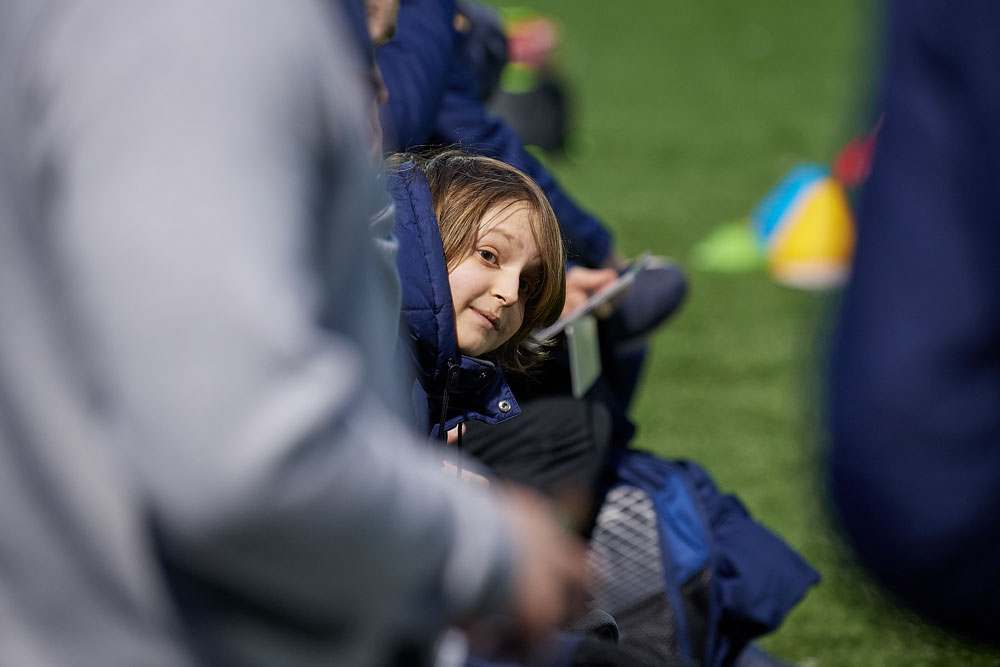
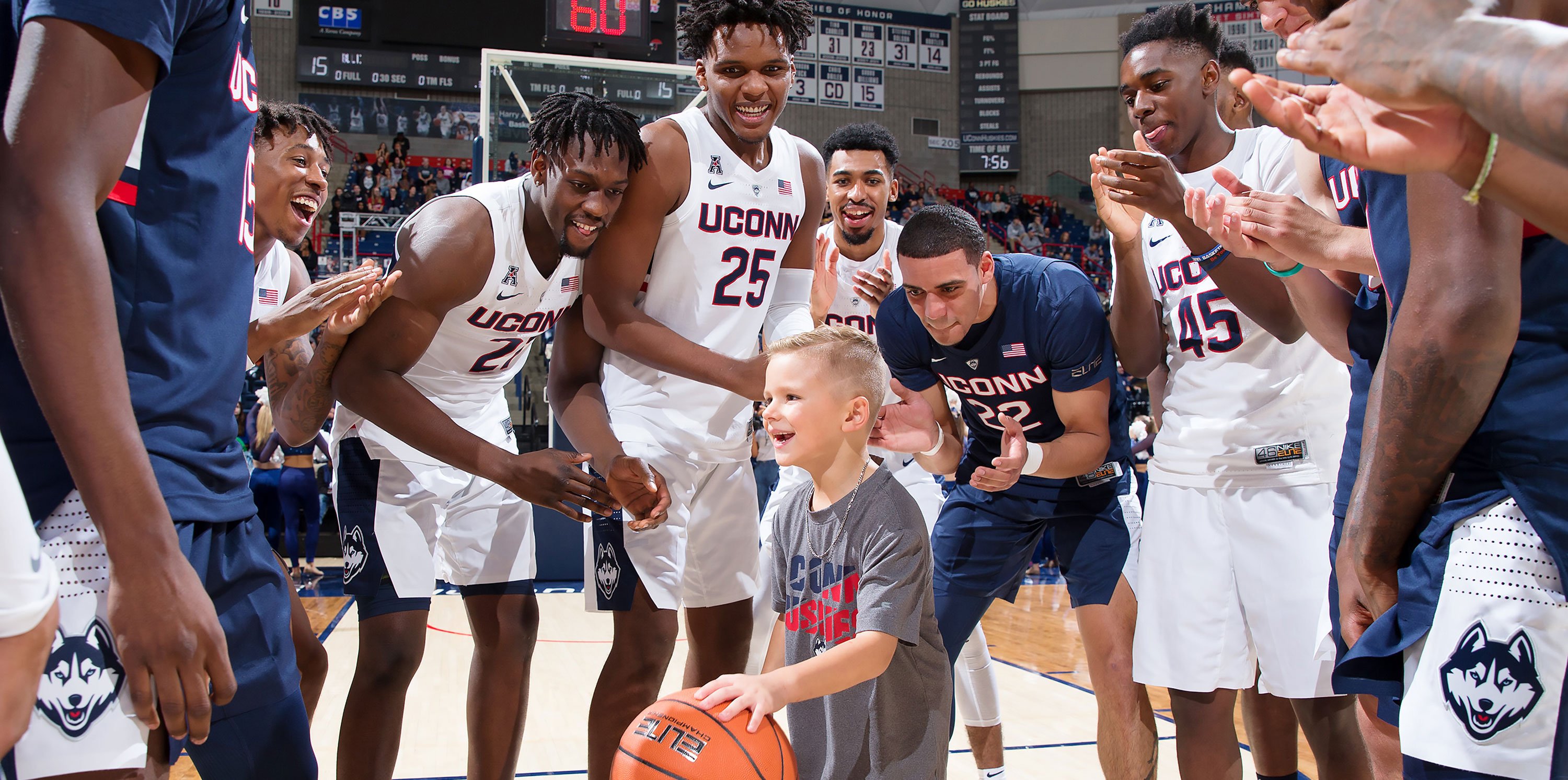
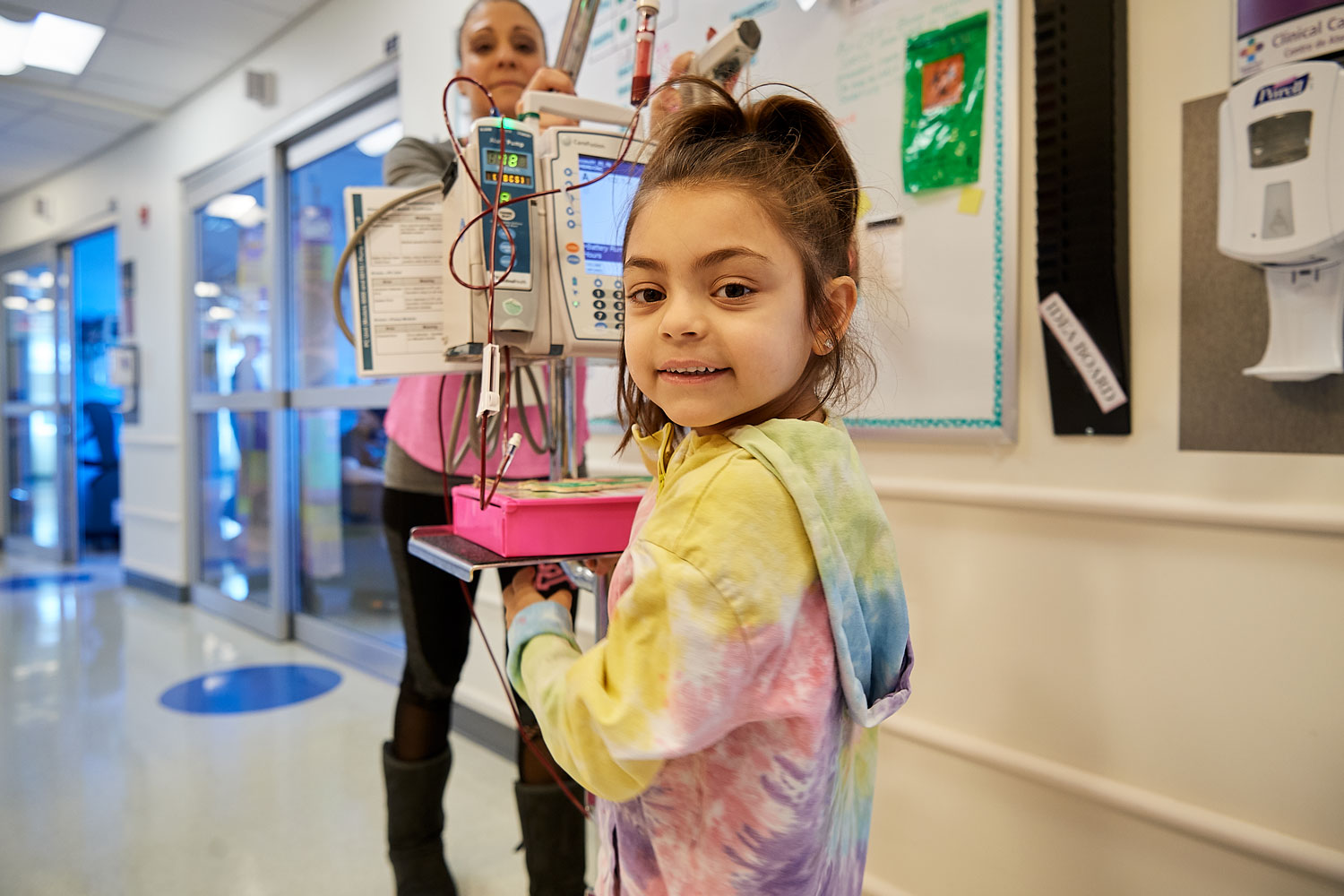
Photos from left: Maddox has been on the bench for all but two men’s soccer home games in the two seasons he’s been with the team; Rylan and his team during First Night of the 2018–19 season; every three weeks Daniela has a six-hour blood transfusion.
“Rylan Gives Us Hope”
When Rylan is with the basketball team, he’s a bundle of energy. The casual observer would be surprised to learn he has an autoimmune disorder that makes him vulnerable to ailments other kids would quickly shake off — a cold will turn into pneumonia — so he doesn’t go to birthday parties during flu season, must cancel play dates if the friend has a cold, and wears mittens when he’s out shopping.
When he was eight months old, an immunologist at Connecticut Children’s Medical Center discovered Rylan’s blood was missing B cells, meaning his immune system has no memory cells. His body showed no sign of the childhood immunizations he had received.
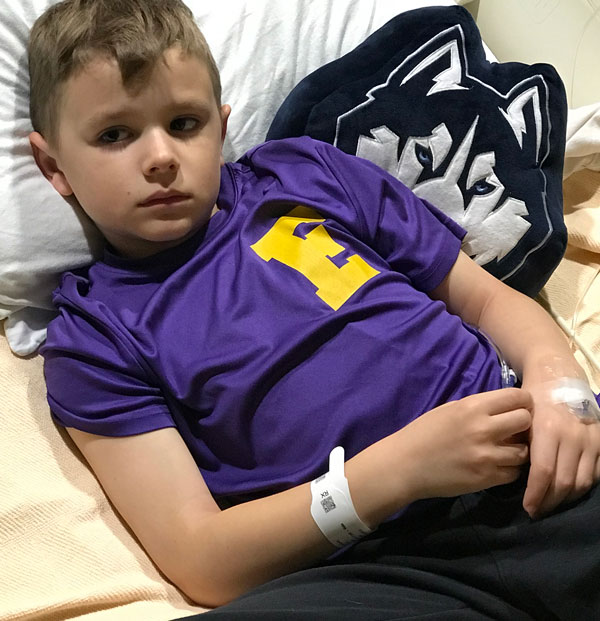
Now Rylan, who lives in Ellington, Connecticut, returns every four weeks to Connecticut Children’s for an infusion drawn from the blood plasma of 100 different donors that confers their immunity on him. The infusion takes 13 hours to complete, and the effects only last a few weeks before Rylan gets cranky, his muscles get sore, and he becomes susceptible to infection again.
By the time Rylan was 5, he was scared of the infusion. “He hated it,” says his mom, Tanya. “He wouldn’t get in the car. He would scream, cry, kick, bite, scratch his way out. It would take five nurses to hold him down just to get the IV into him.”
But then Rylan’s longtime infusion nurse introduced him to Abigail Brouker, a Team Impact kid matched with the UConn Softball team, who was being treated next door. Rylan was so engrossed in Abigail’s story, he didn’t even notice that his dreaded treatment was already under way.
“When we left he was beaming from ear to ear — he was so happy. I don’t get to see him like that a whole lot.”
— Rylan’s mom
The program matched him with men’s basketball — his favorite sport. It was a hit from the get-go. A few of the guys played basketball with him, lifting him up to make slam dunks. “When we left,” says Tanya, “he was beaming from ear to ear — he was so happy. I don’t get to see him like that a whole lot.”
Though he’s now comfortable with the entire team and regularly attends home games, Rylan has formed a special bond with two players he met early on: Mamadou “Mo” Diarra ’20 (CLAS) and Alterique “Al” Gilbert ’20 (CLAS), both of whom have experienced serious injuries that have impacted their careers. With Mo sitting out after knee surgery that cost him most of the season, Rylan would sneak his favorite candy — Sour Patch Kids — to him on the bench when Coach wasn’t looking.
“Rylan gives us hope,” says Mo. “We all go through problems, but ours are temporary and Rylan has something he has to live with for the rest of his life. He comes every day with the same energy, the same excitement, so you can’t sit there and feel sorry for yourself.”
With Al, says Tanya, Rylan will talk about anything — about life, his illness. “It’s just so awesome, because it comes from someone else other than me. Al has great values, and I trust what he says to Rylan completely.”
Says Al, “We’re glad Rylan could be part of the team. For me personally, it’s been a special relationship between me and Rylan. He continues to inspire us all with his fight and determination.”
Rylan shows the players the same empathy they show him. He’ll send Al a congratulatory video after a good game or an encouraging video when Al might be disappointed. After Al suffered a season-ending eye injury in early March, Rylan messaged him as his “soldier-buddy.”
“We just keep going because that’s what we have to do,” he wrote.
Tanya says the effects of Rylan’s time with the team have been profound. He no longer resents his illness and now faces his infusions with confidence. “Going to the games is awesome,” she says, “but the best part of it has been the relationships he’s developed. They’ve changed his outlook on life.”
“She’s Loved By Everyone”
Daniela Ciriello, a first-grader from Plainville, Connecticut, may be seen at women’s basketball home games, jumping for joy behind the bench when her team makes a great play or waving pompoms on the sidelines with the UConn cheerleaders. Despite her exuberance, Daniela has a life-threatening condition that has dogged her since she was a baby: thalassemia major, a rare and severe form of anemia, meaning her blood doesn’t make enough healthy red blood cells.
Daniela must receive regular transfusions that take up to six hours each. This summer will mark her 100th transfusion. The family also monitors Daniela carefully for any sign of infection because of her IV port.
It’s a tough balancing act for the family to coordinate trips to the hospital along with the everyday demands of raising four kids ages 2 to 12, and the family faces additional stress from the expense of Daniela’s treatment: her medications alone cost thousands of dollars a month. They also recently found out that two-year-old Matteo has thalassemia as well, though a milder form.
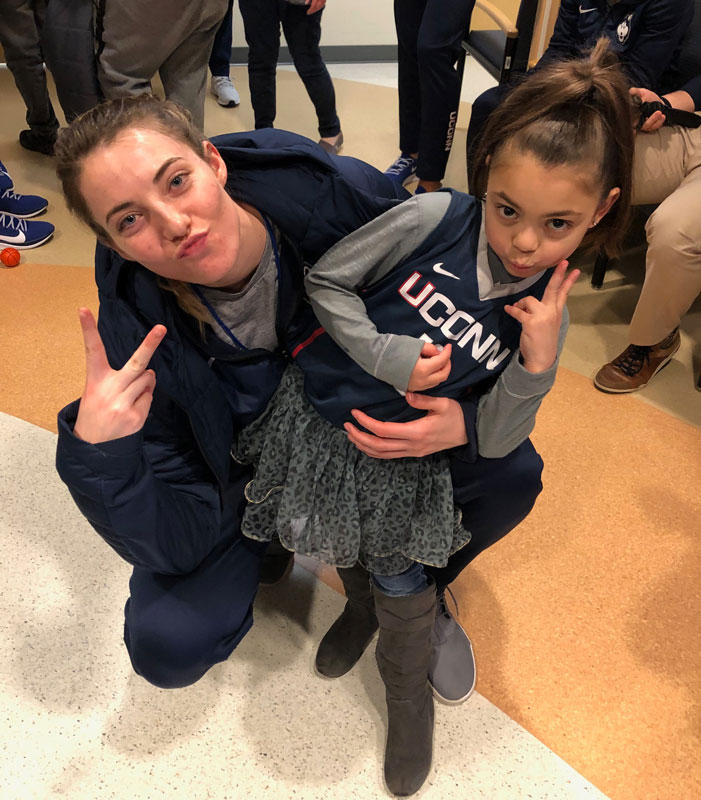
That’s why Team Impact is so special, says her mom, Nicole. “What Daniela does with the team and what they do for us — it’s just fun. It takes our minds off reality.”
The family mostly attended weekend home games this year to work around the siblings’ schedules. The players, of course, also have a lot going on in their lives. And that’s partly what has made for a good fit. “I know how busy they are, they know how busy we are,” says Nicole. “We just make it work.”
Daniela loves throwing miniature soft foam basketballs into the crowd after a home win, and even when she watches the games at home on TV, she jumps up and down with her blue-and-white pom-poms, cheering for her team.
Before almost every game, says her mom, Daniela records a good-luck video telling the team to “kick butt.” When she’s in the hospital, she’ll make a video telling them they inspire her. “It gives her a little boost of energy,” Nicole says: “If you can do it, I can do it.”
When Coach Auriemma was sick and missed a couple of games, Daniela put on her best dress and recorded a get-well video for him, including a reminder to be sure and watch the games. The players in turn mail her postcards from the road, as well as Christmas and Valentine’s cards.
“She really lights up,” says Nicole. “I think she feels like she’s part of something, seeing how much they care about her and how much they include her.”
Kyla Irwin ’20 (CLAS), one of the players who’s developed a rapport with Daniela, says Team Impact is “a really great opportunity to take yourself outside of your usual life.” She says the team doesn’t discuss health issues with Daniela. “We want her to focus on other things and feel included in everything we do, make sure she knows she’s loved by everyone.”
The Ciriellos, however, also have a serious purpose behind the videos they send from the hospital — they hope to raise the team’s awareness of the importance of blood donation. “We’re very big advocates of giving blood,” says Nicole, whose family organizes blood drives every year. “Giving blood doesn’t cost anything, and it doesn’t take very long. Blood is what’s keeping Daniela alive.”
“One of the Guys”
Fifteen-year-old Maddox Bruening joined the men’s soccer team in April 2017.
Maddox was diagnosed at age 1 with eosinophilic esophagitis, a gastrointestinal disorder involving multiple food allergies that cause inflammation of the esophagus. Eating isn’t fun. And because he can’t consume enough food by mouth, he gets most of his nutrition from a liquid feed delivered through a tube into his stomach.
Active and energetic, Maddox loves to play soccer, basketball, and lacrosse in his hometown of Glastonbury, Connecticut. He has missed only two UConn home games in two seasons. Maddox also joins the team at some nearby away games, as well as workouts, practices, and team meals.
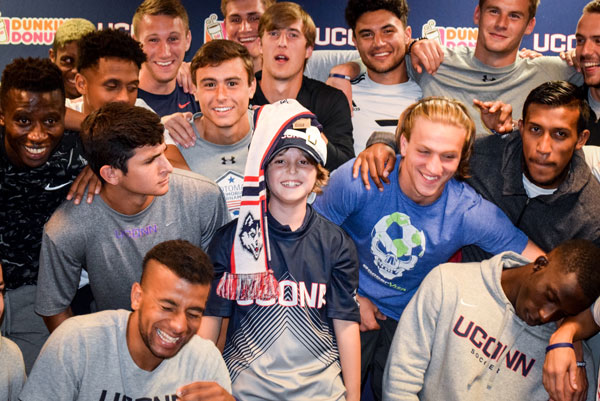
He has shadowed student-athletes serving as counselors at the Ray Reid Soccer Camp, been recognized with other Team Impact kids and teams during halftime at a basketball game, and attended a Team Impact gala where he met NFL player Julian Edelman of the New England Patriots.
At the heart of his interaction with the team is a strong connection with George Kutrubis ’20 (CLAS), a pre-med student who thinks of Maddox as a younger brother. “He definitely brightens the mood wherever he goes,” George says. “He’s a very positive guy, and it’s just great having him around.”
George and Maddox tease each other like brothers do. And George says he also feels like a second dad to Maddox at times, reminding him to eat his lunch or wear extra layers on a cold day. Maddox doesn’t mind. He says it’s good to have someone other than his mom be on his case.
“He’s had to cope with some mean people, so to be surrounded by so much positivity, it’s been life changing.”
— Maddox’s mom
The two exchange text messages often, talking about school or video games or the family dog. But they don’t talk about Maddox’s health. “It seems like he doesn’t want to bring that part of his life into this one, which I understand,” George says. “Maybe it makes him feel more normal than he feels otherwise.”
Maddox’s mom says he looks up to the student-athletes as role models. He hopes to go to college himself one day, and George promises to stay in touch after he graduates, so he can mentor him in the college application process.
Though Maddox plays it cool about his illness at school, too — he says only a couple of his friends know about his feeding tube port — he hasn’t escaped being bullied for other things.
Being on the Men’s Soccer team helps him get past the difficult times — even though at first, his peers didn’t believe him. In eighth grade, when his class played “Two Truths and a Lie,” his classmates called him out for saying two lies: “I like eating milk chocolate” (he’s allergic to it) and “I’m a member of the UConn Men’s Soccer team.” But they had to take it back when Maddox pulled up a video of his signing ceremony with the team.
For Maddox’s mom, the time the family spends at soccer games, or out to dinner while Maddox is at practice, is “a respite from the real world.”
Recently, as if the transition to high school wasn’t enough, Maddox was diagnosed with Sever’s disease, an inflammation that often affects active kids going through a growth spurt. Not only has he had to cut back on participating in his beloved sports, he also has to do physical therapy three times a day.
The team has helped him get through. When he balked at having to go to yet another specialist about the pain, they encouraged him to stay the course. And continuing to hang out with the players on campus has provided an ongoing outlet for his passion for sports.
“He just wants to be part of the team, one of the guys,” says his mom. “He’s had to cope with some mean people, so to be surrounded by so much positivity, it’s been life-changing,” she adds.
“It’s a different kind of healing.”
The Rest of UConn's Team Impact Team:
Photos courtesy of Team Impact and families
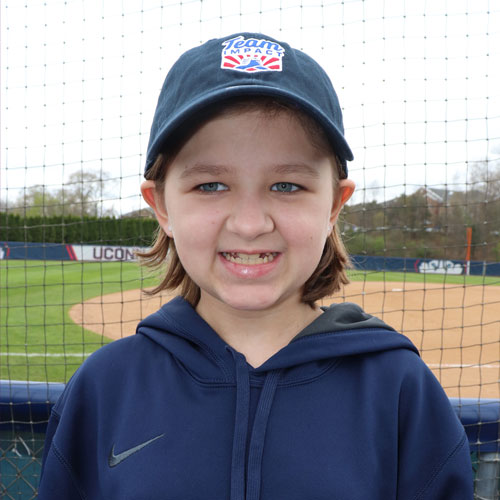
Abigail Brouker, 13, of Unionville, Softball, since September 2017. Abigail had leukemia.
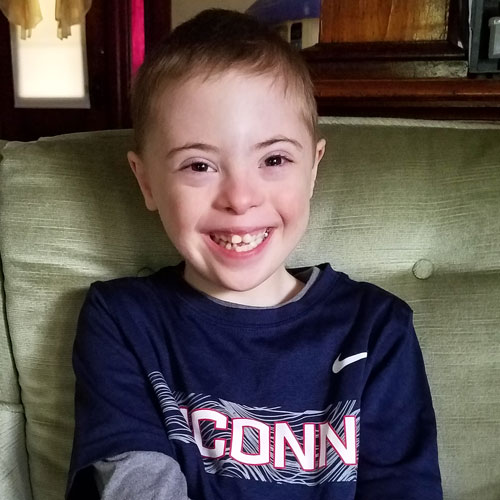
Caleb Curran, 6, of Manchester, Men’s Tennis, since February 2018. Caleb has a cardiac disorder and Down syndrome.

Ashley Greenier, 10, of Vernon, Women’s Ice Hockey, since April 2017. Ashley has a lung disorder.
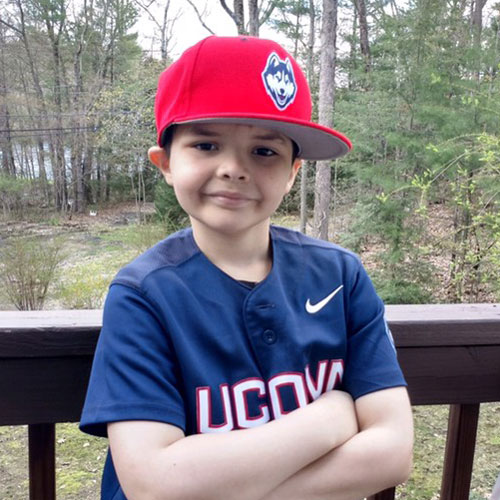
Grayson Hand, 9, of Sturbridge, Massachusetts, Baseball, since March 2015. Grayson had leukemia.
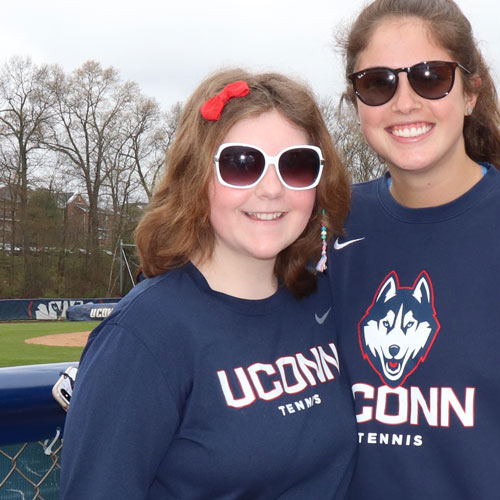
Genevieve Neiman, 13, of Somers, Women’s Tennis, since January 2017. Genevieve had leukemia.
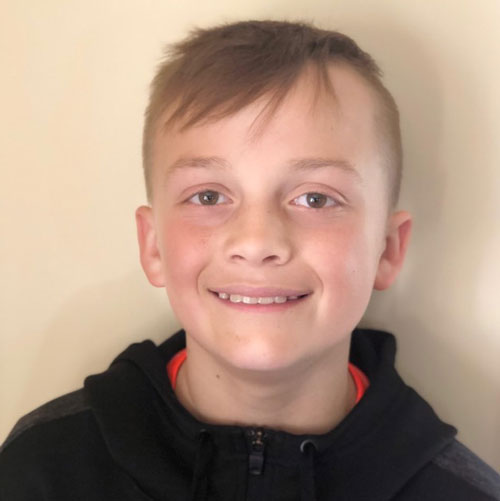
Camden Soucy, 11, of Tolland, Men’s Ice Hockey, since April 2014. Camden had neuroblastoma.
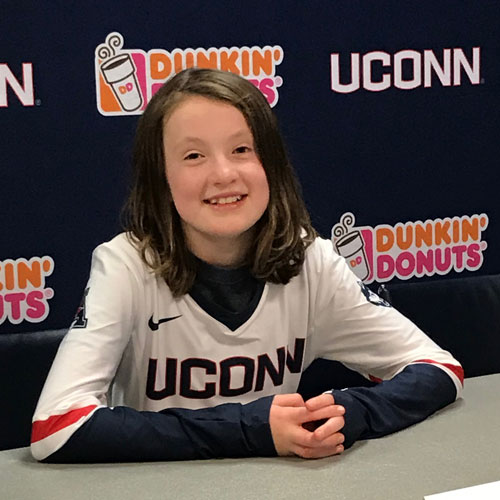
Elsa Nocton, 12, of Storrs, Women’s Volleyball, since March 2018. Elsa has a neuromuscular disease.
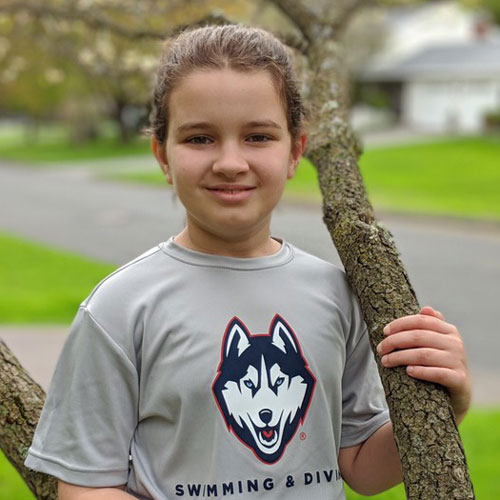
Meredith Ross, 10, of Vernon, Women’s Swimming and Diving,since January 2019. Meredith had leukemia.
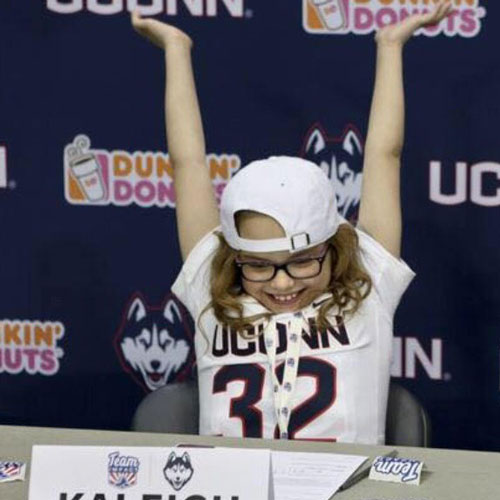
Kaleigh Thereault, 9, of Manchester, Women’s Lacrosse, since August 2018. Kaleigh has tuberous sclerosis complex.

Rebekah Tirrell, 14, of Putnam, Women’s Soccer, since April 2019. Rebekah has juvenile idiopathic scoliosis.

Leave a Reply